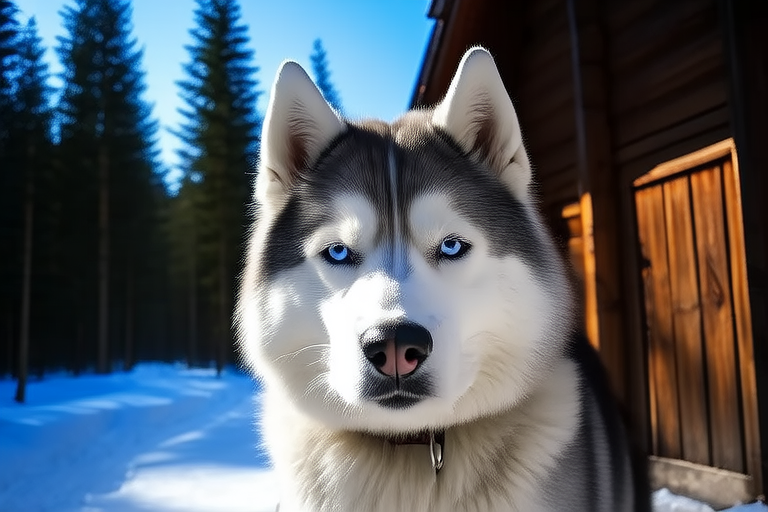Siberian Huskies Unveiled: Myths and Realities of Owning One
Welcome to the world of Siberian Huskies! These beautiful, energetic dogs have captured the hearts of many pet lovers around the globe. However, owning a Siberian Husky comes with its own set of unique challenges and realities that might surprise you. Let’s dive into some common myths and the actual truths behind owning one of these magnificent creatures.
Myth #1: Siberian Huskies Are Suitable Apartment Pets
One of the most prevalent misconceptions about Siberian Huskies is that they can thrive in an apartment setting. While it’s true that some smaller breeds can adapt well to apartment living, Siberian Huskies are far from being one of them. These dogs were bred to run long distances and need ample space to expend their boundless energy. Without sufficient exercise, they can become restless, destructive, and even aggressive. As someone who has lived with a Husky, I can attest to the importance of providing them with large outdoor areas where they can run freely.
Myth #2: Siberian Huskies Have Minimal Shedding
Another widespread belief is that Siberian Huskies shed less than other dog breeds. This couldn’t be further from the truth. Siberian Huskies are double-coated, meaning they have both an undercoat and an outer coat. They shed heavily twice a year during the change of seasons, but also continuously throughout the rest of the year. If you’re not prepared for constant grooming and hair cleaning, a Siberian Husky may not be the right choice for you.
The Reality of Owning a Siberian Husky
Exercise Needs
Siberian Huskies are incredibly active dogs, requiring at least two hours of exercise daily. This doesn’t just mean walks; it means running, playing fetch, and engaging in activities that challenge their minds and bodies. A bored Husky can quickly turn destructive, so finding ways to keep them mentally stimulated is crucial. For instance, I’ve found that teaching my Husky new tricks or introducing puzzle toys helps satisfy their need for mental engagement.
Dietary Requirements
Proper nutrition is vital for maintaining your Husky’s health and energy levels. These dogs require a high-quality diet rich in protein and fat, similar to what they would eat in the wild. It’s important to consult with a veterinarian to determine the best food for your specific Husky, taking into account factors like age, weight, and activity level. Feeding them a balanced diet ensures they maintain their muscle mass and overall vitality.
Social Behavior
Siberian Huskies are known for their friendly and sociable nature. They generally get along well with children and other pets, making them great family companions. However, they are pack animals and prefer having other dogs around. They can sometimes be independent thinkers, which can make training challenging. Patience and consistency are key when it comes to training a Husky. Positive reinforcement methods work best, rewarding good behavior rather than punishing bad behavior.
Training Challenges
Training a Siberian Husky can be quite an adventure. Their intelligence and independence mean they can sometimes be stubborn or distracted. Basic obedience training is essential, but it requires patience and persistence. It’s important to establish yourself as the leader of the pack from the start. Consistent training sessions and rewards for desired behaviors will help reinforce your authority and teach your Husky what is expected of them.
Health Concerns Specific to the Breed
Like all dog breeds, Siberian Huskies are prone to certain health issues. Some common conditions include hip dysplasia, eye problems such as cataracts and progressive retinal atrophy, and skin allergies. Regular veterinary check-ups and proper care can help catch and manage these issues early. Additionally, maintaining a healthy weight and providing a nutritious diet are crucial for preventing obesity-related health problems.
Tips for First-Time Owners
If you’re considering bringing a Siberian Husky into your home for the first time, there are several things to keep in mind:
- Research extensively: Learn everything you can about the breed before committing to ownership. Understanding their needs and temperament will prepare you for the responsibilities ahead.
- Prepare for the commitment: Owning a Husky is a long-term commitment that requires dedication and effort. Be ready to provide them with the love, attention, and care they deserve.
- Seek professional advice: Consult with experienced breeders, trainers, and veterinarians who specialize in Siberian Huskies. Their expertise can be invaluable in helping you navigate the unique challenges of raising one.
Ensuring a Happy and Healthy Life for Your Siberian Husky
To ensure your Siberian Husky leads a happy and healthy life, follow these guidelines:
- Provide plenty of exercise: Make sure your Husky gets enough physical activity every day to prevent boredom and excess energy.
- Offer mental stimulation: Engage your Husky’s mind with puzzles, training sessions, and interactive games.
- Maintain regular vet visits: Schedule routine check-ups and vaccinations to monitor your dog’s health and catch any potential issues early.
- Groom regularly: Brush your Husky frequently to reduce shedding and keep their coat healthy.
- Build a strong bond: Spend quality time with your Husky, building trust and affection through positive interactions.
Owning a Siberian Husky is a rewarding experience, filled with joy, loyalty, and companionship. By understanding the realities of their care and needs, you can provide your furry friend with the best possible life. Remember, with the right approach and dedication, you’ll create a loving and fulfilling relationship that will last a lifetime.
